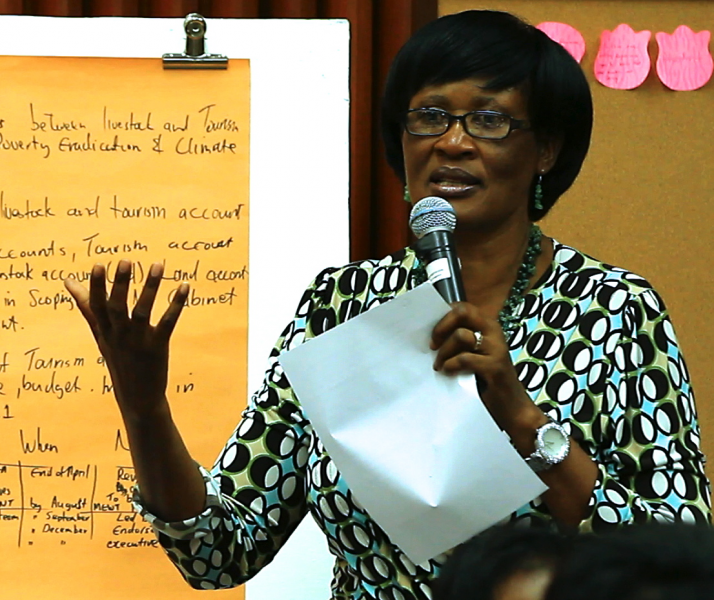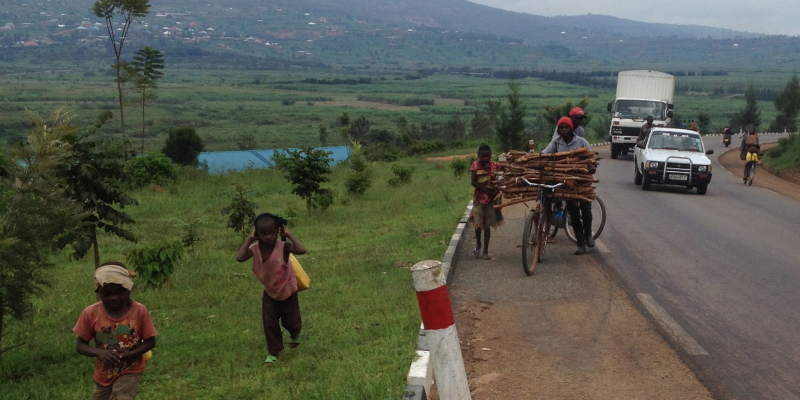Portia Segomelo, until recently the natural capital accounting (NCA) coordinator for Botswana, and now in a new advisory role, recently visited Kigali to facilitate Rwanda’s NCA process by sharing Botswana’s experience in developing water and mineral accounts.

She spoke to the WAVES team on a range of issues including her involvement in Rwanda as well as Botswana’s experience with natural capital accounting.
How can Rwanda learn from Botswana’s natural capital accounting process?
Exchange programs between natural capital accounting implementing agencies can enhance south-south cooperation while imparting knowledge. Botswana can showcase positive practices and at the same time help Rwanda to advance through the process more efficiently by learning what worked and did not work in Botswana.
As in Botswana, the use of consultants will be critical during the first few years of Rwanda’s NCA efforts to support construction of templates, data coding, populating supply and use tables, analysis of data and reporting. Through exchanges and advice based on Botswana’s experience, Rwanda can advance on capacity building, establishing coordination platforms and forward planning.
All this is needed to transition to the position where government officials and specific institutional units are fully responsible for preparing and updating the natural capital accounts at regular intervals.
Both Rwanda and Botswana are signatories to the Gaborone Declaration for Sustainability in Africa (GDSA), and working with WAVES can help Rwanda meet its commitments under the Declaration.
Why should African countries pay attention to NCA as a facilitator for sustainable national growth?
African countries are predominantly natural resource-based economies and in the context of a changing climate and prevalence of poverty, sustainable development may not be easy to attain. This makes it more important than ever to know the value of natural assets and the contribution that natural resources make to the economy.
Natural capital accounting provides a methodology that systematically profiles the stocks of natural resources and plots their economic value and trends in their management.
By joining the WAVES partnership, information generated from the accounts can provide results that Rwanda can use in its development planning process–considering the trends in land and water use, and the trade-offs that may be emerging between sectors.
The NCA approach is also flexible and expects efforts to be based on national policy priorities. For example, for Rwanda, issues relating to land management, water use efficiency and mineral assets can be informed through natural capital accounting endeavours.

From Botswana’s experience, what are some of the tangible impacts following the implementation of NCA that Rwanda can replicate?
If the Botswana NCA story is anything to go by, the most tangible results that Rwanda can draw from would be the NCA institutionalization model where the key government agency takes responsibility to undertake regular NCA activities, with expert support where required. This means the NCA work is driven by the needs and policy priorities of the agencies that manage the resources, yet compiled in a format that is internationally accepted and consistent with the national GDP accounts kept by the Ministry of Finance.
In light of this, Rwanda will be best served when land, water, mineral and ecosystem accounts are hosted within relevant government departments with the responsibility for those respective sectors. Accounting units would be established and their functionality is enhanced through Technical Working Groups (TWGs) that provide data, ensure technical accuracy of data, appropriateness of analysis to provide sound results and expand the knowledge base for long-term natural capital accounting. Exchanges with Botswana are intended to advance Rwanda’s development along this path.
What are some of the best practices from Botswana that you hope to introduce to Rwanda to facilitate achievement of program objectives?
- High-level government commitment through a multi-sectoral steering committee is an imperative for oversight function and to provide policy guidance for NCA activities.
- Linking NCA to national planning and sustainability frameworks makes it relevant to investment since the results will inform national development plans, national visions, as well as poverty reduction strategies and climate change adaptation strategies.
- Coordination of the NCA program within a sector that has convening power, possesses the mandate to coordinate national development planning and budgeting, and develops and monitors implementation of macro-economic indicators for sustainable development, which is vital. This could be the Ministry of Finance and Development Planning, for example.
What are the next steps?
It is important to facilitate close working relationships between NCA units in Botswana and Rwanda to allow for the exchange of tools and experiences moving forward. We are planning a technical cross visit for interactive sessions based on water accounts, TWGs and the National Steering Committee.
There will also be streamlining of data management systems between accounting teams, providers of data, and users of accounts as an important step towards a sustainable NCA process.
Consequent steps will also see the initiation of an NCA institutionalization program that is based on a shared vision within government while recognizing the role of other supporting structures. This would be imperative to secure the necessary buy-in and commitment of planning, personnel, financial and budgetary resources moving forward and within the context of the EDPRS and other planning frameworks.
There will also be deliberate efforts to communicate the utility of NCA tools in informing policy and disseminating the results of the accounts when they become available across all sectors of the economy using appropriate tools.
